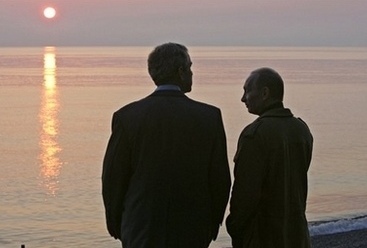Putin, Bush fail to bridge difference on missile defense
(Xinhua/Agencies)
Updated: 2008-04-06 17:10
Updated: 2008-04-06 17:10
White House press secretary Dana Perino described the mood over dinner as "warm, congenial, very comfortable, easygoing."
Known for their blunt talk and candor, Bush and Putin have never been afraid to hide their differences. Their meeting will close a seven-year relationship that got off to a strong start and was strengthen by cooperation after the Sept. 11 attacks, but then turned rocky on differences ranging from the Iraq war to Kosovo's independence. Putin has bristled at Bush's admonishment that Russia has retreated from democracy.
|
|
US plans to build a long-range missile defense system in Europe won endorsement at NATO's summit this week, and the White House had hoped Putin would reluctantly accept it, recognizing he could not stop it. The United States has offered a series of concessions to make it more palatable to Moscow. But apparently not enough.
"We're going to have to do more work after Sochi," Perino said on Air Force One as Bush traveled from Croatia, one of NATO's two new members. Asked about prospects for a deal, she said, "That would be premature."
"No one has said that everything would be finalized and everyone would be satisfied with all the preparations because we haven't even started to work on the technical aspects of the system," she said. "But we think the dialogue is headed in the right direction and that this meeting will be able to push that along even further."
Bush and Putin are expected to sign a "strategic framework" to guide future relations. US officials hope the Russians, in the broad context of that statement, will say they are willing to cooperate on missile defense. That would be short of a Russian embrace of US missile defense plans, but it appears to be the best the administration thinks it can achieve now.
Perino said the framework would deal with security cooperation, nonproliferation issues, counterterrorism and economic matters, and that the language would be broad. "I don't expect a lot of details," she said.
Before coming to Russia, Bush stopped in Croatia to celebrate NATO's expansion eastward in Europe. Croatia and Albania were invited to join NATO, while Macedonia's bid was put off. The two newest members will boost NATO's ranks to 28 nations committed to helping defend each other.
"Henceforth, should any danger threaten your people, America and the NATO alliance will stand with you and no one will be able to take your freedom away," Bush said to cheers from thousands packed into St. Mark's Square. The area has been used for the inauguration of every Croatian leader for the past 700 years and is considered the center of Croatian politics.
The US desire to see NATO admit Ukraine and Georgia -- and to keep the door open for others -- angers Moscow. In a victory for Putin, the two former Soviet republics were turned away from NATO membership this week. But Bush and his aides have been quick to point out that alliance leaders vowed to eventually open the path to joining, possibly as early as December. Putin's victory, they say, may be short-lived.
Bush pointed out the success of US-supported democratization in the volatile Balkans, where the effects of the breakup of the former Yugoslavia still roil relations between Washington and Moscow. Most recently, the United States and many of its European allies rallied around independence for the Serbian province of Kosovo. Russia, supporting Serbia, strongly opposed that, too.
Bush also discussed the importance of security and stability in the Balkans, noting that at their summit in Romania, NATO leaders offered "intensified dialogue" to Bosnia and Montenegro, two other states once part of Yugoslavia.
"The NATO alliance is open to all countries in the region," he said. "We hope that, soon, a free and prosperous Serbia will find its rightful place in the family of Europe and live at peace with its neighbors. With the changes under way in this region, Europe stands on the threshold of a new and hopeful history."
Croatia's former nationalism once made Washington wary, and it drew Bush administration ire by opposing the US-led war in Iraq and refusing to allow US soldiers exemption from war crimes prosecution. But Croatia's emergence as a stable nation in the turbulent region, the pro-Western government it elected in 2000 and its contribution to the fight in Afghanistan more recently has earned it US support.
|
||
|
||
|
|
|
|


